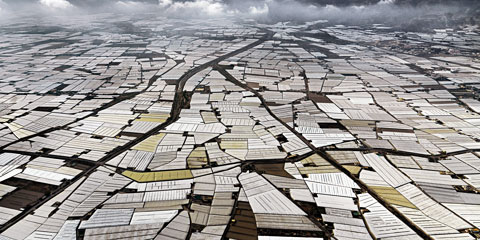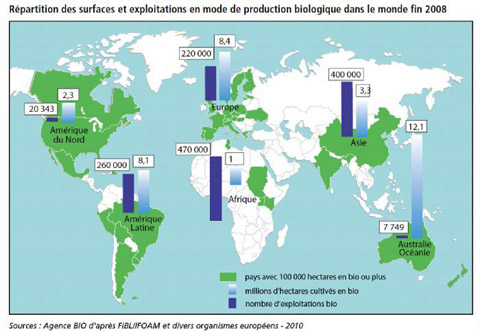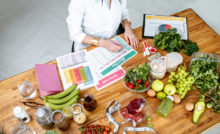

Greenhouses out of sight ! (Photo : National Geographic)
With a turnover increased 19% in 2009 for organic products, the sector has the wind in its sails. Long abandoned by supermarkets and manufacturers because considered marginal, the bio has become for them must.
The problem is that we are facing a industrialization of organic. It is necessary to, After the manner of conventional products, appeal to the largest number by creating sanitized products, well packed, to taste goes everywhere.
The large distribution does not turn to small craft manufacturers, who can provide enough food and a floor price, but to the large industrial groups which are absorbed this juicy market.
This is the era of organic farming intensive and industrial with the monocultures, the monoelevages gigantic, au développement de l’import food from the other side of the world, to the relief of the specification of labels bio, to the non-respect of workers, to the Standardization of costs, etc. As stated so well Picard, for example, "Need us bio beauty..
Nous assistons ainsi à une perversion de l’idéologie “bio” d’origine de la petite paysannerie, that cultivate ancient varieties with unique flavors in respect for the Earth and the environment.
An industrial size
End 2008, more than 35 million hectares are cultivated in organic agriculture in the world, According to IFOAM (International Federation of Organic Agriculture Movements). The new European regulation allows a breeder to produce up to “75 000 poulets de chair bio à l’année et ne limite pas la taille des élevages de poules pondeuses bio”. Bionest making organic strawberries in Andalusia has 500 hectare greenhouses. AgriEco product, with its 160 hectares of greenhouses, more than 11 000 tons Peppers, tomatoes and organic cucumbers [1].


Import : products off season with less taste
60% of organic fruit and vegetables are imported into France. ProNatura, the current market leader, has been the bio first to commercialize fruits and vegetables out of season. It does not seem surprising for the consumer to find radius of Strawberry bio or not, in the month of January for example. These imports yet promote the greenhouse gas and significantly increase costs products. According to WWF, a fruit imported off-season by aircraft is 10 to 20 times more consumer of oil that the same fruit bought locally and in season. All this is not to mention the taste of the fruit that will not be as many flavours as often picked a less mature. The taste is also often less good, less pronounced because emphasis varieties with high yields, resistant to transport, which keep well, etc. at the expense of flavours.
Regulation arranged
Large cooperatives, who have financial interests in the GMOS, influence regulatory institutions to such an extent that a new European regulation allows for 0.9% of GMOs in organic products and the possibility of using the pesticides When there is no equivalent, While the European Parliament was opposed ! The farmer and activist by Nature and progress, Guy Kastler bondit “The bio is completely incompatible with GMOs […] We continue to demand 0% of GMOs! The new regulation defines standards and can desire agricultural practices. It is passed to an obligation of means to an obligation of result. C’est la porte ouverte à la généralisation d’une agriculture bio industrielle”.
While in France it was necessary that organic farmers produce 40% food for their animals on their land, the new European regulation requires not. Food, consisting primarily of soybean, is imported as much cheaper, the same problems that the imported fruits and vegetables seen above.
Enslaved producers
Daniel Florentin, membre de la Confédération paysanne affirme que “les producteurs sont sous contrats serrés et lose their autonomy. They are heavily indebted for at least twenty years and must deliver the totality of their production to the cooperative, which is committed to take, without predetermined price. It is a pure integration system, current in conventional intensive farming».
Des petits producteurs de soja bio en Amérique latine dépendent de grosses sociétés d’exportation et “refusent les visites de la presse”, that is to say the lack of transparency of the groups.
Ecological and sociological disaster
The example of Strawberry bio
The Bionest in Spain company, for example, grown under hundreds of hectares of greenhouses one organic Strawberry variety which is “particulièrement polluante et exploiteuse en main-d’œuvre”. This company is located among many other more or less illegally in the natural park of Doñana (world heritage of Unesco) According to WWF-Spain. The culture technique is very similar to that of conventional crops (drip, use of fertilizers, monoculture…).
Bionest employment of women, for the harvest of their fruits, who come from Romania, Poland, of the Philippines, who don't know their rights and are totally subjected to their employers (prohibition of visits, passports confiscated, outputs controlled, etc.). The working conditions are especially difficult for them and are not different from those of the conventional enterprises. Selon Le monde diplomatique “Bionest n’est pas un cas isolé en Andalousie”.
José Bové at the press conference at the European Parliament in Strasbourg (2010) :
Here is an episode of Capital broadcast on M6 to better realize what is farming of strawberries in Spain :
The example of organic palm oil
L’Palm oil bio It is part of the ingredients of most processed organic products. In Colombia, the Daabon group is a multinational company that owns the thousands of hectares of Oil Palm, banana, cocoa and organic coffee. The Davila family, group owner, is in close relationship with former president Alvaro Uribe that has, During his two terms, Clerk of thousands of murders with the army and who with the help of paramilitaries did move massively peasants of their land for that companies can plant bio oil palms.
We see with these two examples as a bio monoculture very large-scale, that violates the rights, the conditions of work and life of men and destroys the environment, constitue une véritable dérive à “l’idéologie bio”.
To a control of seed
A member of the Verde, a small agricultural cooperative created in the years 1980, far from the abovementioned derivatives, affirme que “Si l’agriculture biologique ne sert pas à rétablir l’équité, justice, autonomy, self-sufficiency and food sovereignty, It makes no sense. And certifiers are not helping. A farmer who diversified their crops and cultivates several varieties will be more heavily taxed than one who does the intensive monoculture».
These small farmers cannot also, due to certain laws, certify their ancestral seeds. European legislation requires that organic certified seed should be used and that if they do not exist it is possible to use the conventional. “Pour le moment, everything happens at the edge of legality, But if tomorrow the sale of our products is prohibited, It will require us to grow with organic seeds sold by Monsanto».
There is also the problem of the crossing of the seed between organic crops and GMO crops. This is for example the case in Spain in Aragon where 80% corn bio is contaminated by GMO fields surrounding (by the wind, rain, etc.).
The problem of the bio in France
“Les Français adorent le bio-même s’il leur coûte plus cher-, they buy and ask for more. Paradoxically, the second agricultural power in the world is unable to provide bio. Les distributeurs sont donc contraints d’importer massivement.” affirme l’Express. Et rajoute “Le bio en France, It is the story of the Hare who starts the race, run out of steam, slows down, s’arrête et se fait dépasser par tous ses concurrents.”
Vincent Perrot, speaker to the National Federation of organic farmers explains «» The political will to support the bio has so far been little, […] The agricultural France is marked by intensive agriculture, dominated by the lobby of large farms. "Our culture was too long that produce more for export more.. In the country which is the 1st consumer of pesticides in Europe, the bio is not seen very positively of the chemical.
Les grands céréaliers “qui ne jurent que par les grands rendements” sont les plus résistants à se convertir au bio pénalisant ainsi toute la chaine de production alimentaire car il faut, as we have seen, some organic cereals to feed organic livestock.
Movements against the intensive industry bio
There is in many countries more in addition to peasants and small cooperatives that are resistant against the industrialization of bio and who advocate for responsible management of organic products.
“Des réseaux de défense des semences paysannes se développent pour imposer le droit des paysans à produire et à commercialiser leurs propres semences” Note Le Monde Diplomatique.
The AMAP (Associations for maintenance of peasant agriculture) which are directly related to consumers and producers are so successful that they are unable to meet the demand.
We are, of course, for consumption of products bio but on condition that it is thoughtful and responsible. On the be repeated not enough, to eat as possible to seasonal and local products ! Nous conseillons également d’avoid bio meals, usually containing various additives, Palm oil, too much salt, or even of GMOs, etc. Prefer raw products, unprocessed, take the time to cook and discover the flavours of original authentic varieties grown near you !
Here is a little picture of the Nicolas Hulot Foundation to consume fruits and vegetables of the season : Fruits and vegetables of the season
Similar article
Main source :
[1] Le Monde Diplomatique – Février 2011 – Thriving industry of organic agriculture – Rédigé par Philippe Baqué.Philippe Baque, journalist and documentary filmmaker, is coordinator of the project of collective work "of the organic alternative to the 'bio' derivatives - business., what meaning to give to the bio ? "led by the association Alterravia (see here for more details).
Secondary sources :
Bio Agency (www.agencebio.org)
Bio www.organic-market.info (www.bio-Marche.info)
The express : The incredible failure of the organic french
Recent Posts
Cakes, Candy : Warning on nanoparticles
100 % tested products contained nanoparticles ! [...] Les résultats de cette expérience ont…
How to eliminate toxins ?
After a series of festive meals, caloric menus, alcoholic or carbonated drinks,…
Plastic, not so fantastic!
Plastic pollutes the environment, we all know it. Il faut aussi rappeler que les objets…
How to eat healthy during lunch break ?
At work, lunch breaks are often done on the go, en quelques minutes et…
Eat healthy, it's really possible ?
These last years, le bio et le sain se sont imposés avec insistance dans nos…
Sausages and merguez salmonella
The company L’Atelier du Valois has recalled batches of "Plateau variegated" suite…






View Comments
Ou comment les industries de l'agroalimentaire se sont accaparés d'un marché juteux !
Bientôt on va maplus pouvoir faire confiiance aux LOGOS...
Ce n'est pas un scoop...
a big thank you !
Last night on Capital they said that 20% fruit and organic vegetables exceeds the authorized rate ! Scary !!
After buying bio "made in France" on limite surement la casse vu qu'il y a bcp plus de contrôles qu'en Egypte etc...
Hello - je suis l'auteur de l'article du Monde diplomatique qui a inspiré une très grande partie de votre texte. La plupart du temps les informations que vous avez reprises ne sont pas présentées comme des citations... Je le regrette car tout cela est le résultat d'un long travail. You don't quote once my name. Ce n'est pas grave. Mais vous auriez pu au moins indiquer le projet d'ouvrage collectif sur lequel planchent actuellement huit auteurs et dont je suis le coordinateur. Le site de l'association qui porte ce projet était donné par le Monde diplo. I gives you : alterravia.com
Kind regards
Philippe Baque
Hello M. Bailey,
I would firstly like to thank you for the wonderful work you have done, you and your employees.
Your work has been the basis of my article. Quand j'ai lu votre article dans le Monde Diplomatique je me suis empressé de rédiger un petit résumé pour partager ces informations essentielles qui collent tout à fait avec le thème de mon site internet.
Je regrette d'avoir un peu négligé la citation de mes sources (I'd be more vigilant next time). J'espère qu'à présent le tir est rectifié.
I wish you, you and your partners, a good continuation !
Although friendly,
F. Boyat
It would be more accurate to replace "I rushed to write a little summary" by "I hurried paraphrase".
La seule manière correcte pour faire partager un article qui vous plaît est d'en donner le lien à vos lecteurs, No to reformulate it in full, d'ajouter 2 graphics, to get to the original content.
Thanks for this interesting file!
It would require that these information are disseminated more regularly and more intensively to better defend naive consumers and abused by both processes of marketting.
Tout comme si on avait plus conscience au quotidien des conditions d'élevage et d'abattage des animaux à viande nos habitudes alimentaires changeraient radicalement.
"animal feed 100% produced mostly by the farm itself" for the new logo ? HAHAHAHAH.
What I no longer includes, c'est manger des produits locaux, I want well, but they are not "bio", farmers use pesticides and other products. It changes what in this case ? If it can not be trusted with the bio of large surfaces, à Biocoop qui abuse les prix d'ailleurs. What should I eat ?
Do not confuse peasants and farmers who adopt a contact with earth differently. Si l'agriculteur peut s'engouffrer sans scrupule dans l'industrie, the peasant working priori with a lot more carefully his land. Le local ne veut pas dire qu'il s'agit de l'agriculteur qui produit en masse à côté de chez soi, but a person who works with the seasons and without pesticides.
M Hat. Philippe Braque and his team for this great work "borrowed" by F. Boyat which as said Liyanage was mainly paraphase ... Je suis du Québec et je ne fais pas du tout confiance au Bio car je n'y crois tout simplement pas. Qui m'assure qu'ils sont vraiment Bio; a label. Prices are also + élevés à l'achat. Et tous ces fruits qui nous viennent de si loin et qui sont probablement arrosés avec ...quelle sorte d'eau... Vive le bon vieux fumier que l'on répandait à l'automne sur les labours et les jardins et que la pluie arrosait durant l'été. Ces légumes étaient à mon point de vue.... bio.
En effet les industriels de l'agro alimentaire se sont emparés du filon... very very juicy, and the large distribution participates with great linear increasingly long ! But who is found ? Products by copying and pasting other, must be the same meals, meat and other shrink-wrapped, same chocolate bars, les mêmes biscuits... the same bio tagged with teasers, fabriqués avec des productions venant des ailleurs de l'autre bout du monde. Ce bio-là en effet n'est pas dans l'esprit bio. Eating organic is eating season, produits frais que l'on va travailler soi-même, simple or sophisticated products, but healthy, tasty ! Comment des pommes sous plastique venant d'Afrique du Sud peuvent-elles rivaliser avec celles vendues en vrac venant du Sud Ouest de France ? Bio consumed and lived in these circumstances is much less than the consumption "traditional" which shopping carts are filled every week by housewives, and a healthy balanced diet contributes to a great improvement of health (economy for the social security system you are !!!) ! Bio linear large distribution allows them to multiply by 2 leur marge parce les acheteurs se sont mis à la mode sans en prendre l'esprit. Wake up consumers, prenez l'initiative de choisir les yeux bien ouverts ! Il n'y aura plus de mauvais produits ni de mauvais producteurs s'il n'y a pas d'acheteurs.